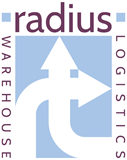When it comes to international shipments, there are a number of different models to choose from. The most suitable largely depends on the products you’ll be shipping and the locations in which your business trades. Cross-trade shipments are one such example and one heavily influenced by globalization. This blog post will explain the complexities of this model and how it can be used by your business with the help of our specialists here at Radius Warehouse & Logistics.
What are Cross Trade Shipments?
Also known as triangular operations or intermediation, cross trade shipments occur when cargo is shipped from one country to another without passing through the country that the shipper’s business has been registered in. They are generally coordinated electronically with the help of specialist freight forwarding companies to manage the logistics.
Cargo shipped in this method can be through road, air or sea – depending largely on the nearest exit point found near the manufacturer/supplier and the entry point nearest to the delivery location.
What are the different types?
There are 3 different types of cross trade shipments. The differences here at large depend on the country locations for the manufacturer, shipper and end customer. These three types are:
- 1. Intra-community triangular operations – In this set-up, all of the countries involved as based within the European Union (EU).
- 2. Triangular (Extra-Community) Operations Mixed – In this set-up, the manufacturer or supplier is based outside of the EU but both the shipper and the end customer are.
- Pure (Extra-Community) Triangular Operations – Here, neither the manufacturer nor the end customer is based in the EU but the shipper is.
All of these types within this shipping model offer varying lead times for shipment. These can be identified and confirmed by the freight forwarding company you invest time in and will help form the basis of your decisions as to whether this is the right solution for you.
How do they benefit businesses?
Many businesses choose triangular operations for the following reasons:
Shorter transportation times
Instead of having a product shipped to the company’s home country and then forward this on to the customer, cross trade shipping allows you to eliminate this step. In turn, this results in shorter transportation times.
Lower supply chain costs
When you work with a respectable freight forwarding company, you’ll be able to benefit from cheaper supply chain costs by eliminating excessive shipping fees.
High efficiency
These models are managed by industry specialists. This ensures that all connection points and cargo movements are kept as efficient as possible – much more so than other individually managed solutions.
Here at Radius Warehouse & Logistic Services, we offer cross trade shipment support to many different clients. Get in contact today and discover how this model can help your business grow without additional labour on your front.



